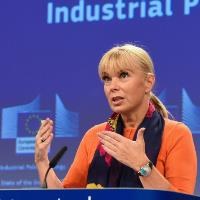(BRUSSELS) – A ‘smart, innovative and sustainable industry’ is the goal of the EU’s new industrial strategy, launched by the European Commission Monday in the wake of last week’s ‘state of the Union’ address.
Industry accounts for two thirds of the EU’s exports and provides jobs for 32 million people, with 1.5 million of these jobs created since 2013. But to maintain and reinforce its competitive advantage, the EU executive says that an important modernisation effort is required.
It says the future of Europe’s industry depends on its ability to continuously adapt and innovate by investing in new technologies and embracing changes brought on by increased digitisation and the transition to low-carbon and circular economy.
The renewed EU Industrial Policy Strategy brings together all existing and new horizontal and sector-specific initiatives into a comprehensive industrial strategy.
It also clarifies tasks ahead and sets out fora to steer industrial policy actions for the future, an annual Industry Day and a High Level Industrial Roundtable.
“In our day and age, industrial policy is about empowering our industries to continue delivering sustainable growth and jobs for our regions and citizens,” said Industry Commissioner Elzbieta Bienkowska. The Commission’s renewed strategy sets out a path towards technological change and innovation, a low-carbon and circular economy and a sustainable industry:
The main new elements of the strategy include:
- A comprehensive package to reinforce industry’s cybersecurity. This includes the creation of a European Cybersecurity Research and Competence Centre to support the development of technology and industrial capabilities in cybersecurity, as well as an EU-wide certification scheme for products and services, recognised in all Member States (adopted on 13 September 2017).
- A proposal for a Regulation on the free flow of non-personal data that will enable data to circulate freely across borders, helping to modernise industry and create a truly common European data space (adopted on 13 September 2017).
- A new series of actions on Circular Econo2my, including a strategy on plastics and measures to improve the production of renewable biological resources and their conversion into bio-based products and bio-energy (autumn 2017).
- A set of initiatives to modernise the Intellectual Property Framework, including a report on the functioning of the Directive on the enforcement of intellectual property rights and a Communication on a balanced, clear and predictable European licensing framework for Standard Essential Patents (autumn 2017).
- An initiative to improve the functioning of public procurement in the EU, including a voluntary mechanism to provide clarity and guidance to authorities planning large infrastructure projects (autumn 2017).
- Extension of the Skills Agenda to new key industry sectors, such as construction, steel, paper, green technologies and renewable energies, manufacturing and maritime shipping (autumn 2017).
- A strategy on sustainable finance to better orient private capital flows to more sustainable investments (early 2018).
- Initiatives for a balanced and progressive trade policy and a European framework for the screening of foreign direct investments that may pose a threat to security or public order (adopted on 13 September 2017).
- A revised list of critical raw materials where the Commission will continue to help ensure the secure, sustainable and affordable supply for the EU manufacturing industry (adopted on 13 September 2017).
- New proposals for clean, competitive and connected mobility, including tightened CO2 emissions standards for cars and vans, an Alternative Fuels Infrastructure Action Plan to support the deployment of charging infrastructure, and actions to foster autonomous driving (autumn 2017).
Putting this holistic strategy into practice is a shared responsibility. Its success depends on the efforts and cooperation of the EU institutions, Member States, regions and most importantly on the active role of industry itself.



